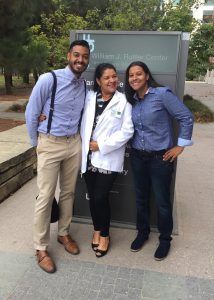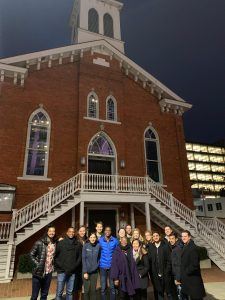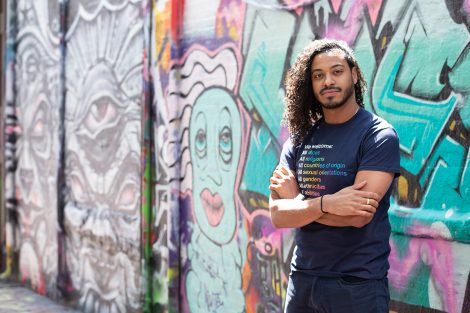From Harlem to East Los Angeles, Angel Rosario, MPH ’19, saw the destructive impact that socioeconomic disparities have on health. He’s on a quest to change that.
May 29, 2019 – It wasn’t until he was in middle school that Angel Rosario got the deep sense “that something was not right.”
Rosario grew up in a Harlem housing project in New York City, the son of poor immigrants from the Dominican Republic with limited educations. The family emphasized the importance of school and Rosario loved learning; that combination helped him to gain placement in his neighborhood grade school’s gifted and talented program and to be admitted to an honors public middle school on the Upper West Side of Manhattan. With the benefit of public programming geared toward underserved black and Latinx youth, he tested into Brooklyn Technical High School, one of New York’s elite public high schools.
But during that first year of middle school, the disconnect between Harlem and the Upper West Side was jarring. At the time, Harlem was beset by the crack cocaine epidemic and drug- and gang-related violence. The Upper West Side was like a different world.
“What I saw there was disparity,” Rosario recalls. “There was a sense of injustice and anger and shame about the life I lived.” At the same time, he was dealing with another challenge: coming to the realization that he was gay.
Rosario, who will earn a master’s in public health in May 2019 from Harvard T.H. Chan School of Public Health, now says that his various identities—gay, Afro-Latinx, from a low-income background, and from a family of immigrants with limited formal educations—provided him with a unique insight into disparities. And he’s committed to fighting them. “I want to dismantle and rewrite the systems that prevent health and social equity,” he said.
Access to care
Rosario studied psychology and biomedical sciences at the University at Buffalo-SUNY. During the summer of his junior year, he volunteered for the Uganda Village Project, a nonprofit that promotes public health and sustainable development in southeast Uganda. In the village of Ibulanku, he helped train community leaders and health workers on topics such as malaria, malnutrition, and reproductive care.
On a visit to Uganda’s capital, Kampala, Rosario saw suffering that brought health disparities into sharp focus. He remembers seeing a child with swollen feet, which suggested a lack of protein in his diet. It reminded Rosario of some of his elderly Harlem neighbors who also had swollen feet, likely caused by heart failure. In both cases, he thought, socioeconomic inequities had contributed to the problem.
By the end of college, Rosario knew he wanted to be a doctor. But first he wanted to learn more about the link between poverty and health disparities in the U.S., in a community like the one he’d grown up in. He applied to the service program AmeriCorps, and was placed with Los Angeles-based AltaMed Health Services, the largest community health center in the country serving primarily underserved populations. His original plan was to work there for a year while working on his medical school application.
He wound up staying at AltaMed for six years—two with AmeriCorps, and four working directly for AltaMed—in part because he loved community health work, and in part to gain financial footing as an independent adult living without family on the west coast.
Rosario had various roles at AltaMed. He taught classes on topics such as hypertension, diabetes, stress, and tobacco cessation at clinics in the predominantly Latino community of East Los Angeles; helped children and parents in Santa Ana make fitness and nutrition improvements, with the goal of reducing childhood obesity; implemented routine HIV testing at clinics in Los Angeles and Orange Counties; and served as a clinic administrator.
Working at AltaMed got Rosario thinking about access to care. For instance, AltaMed’s HIV programming offered bus vouchers to enable patients to attend their medical and behavioral health visits, removing a barrier for access. “I became interested in learning more about the role that institutions play in helping address disparities so that people can get the care they need,” Rosario said.
Leadership lessons

Rosario came to Harvard Chan after his third year of medical school at the University of California San Francisco, where he participates in the Program in Medical Education for the Urban Underserved (PRIME-US), for students who plan to work in urban underserved communities. The program requires students to earn a master’s degree in a field that amplifies their work. Rosario chose to pursue a degree in public health focusing on health care management so that he could learn more about leading organizations.
“At AltaMed, I was thrown into positions of power very quickly so I had to do a lot of learning on the fly,” he explained. “But I never had formal instruction as to how a health system works, budgeting, things like that. I wanted to leverage my prior experiences and give them context in a public health degree.”
Rosario said it was a “huge blessing” that he received a Zuckerman Fellowship to attend Harvard Chan School. The Fellowship provides full funding for people in the fields of medicine, law, and business to pursue public service degrees at Harvard, with the goal of equipping them to provide leadership for the common good.
Being in the Zuckerman program—which included participating in leadership seminars and cohort-based learning with 15 other Zuckerman Fellows—has been both professionally and personally rewarding, Rosario said. In addition to the academic training, his Zuckerman cohort was “a core group of people who have your back, no matter what,” he said.

One highlight of the program was a group trip to Montgomery, Alabama, in which the Fellows learned collectively about policy issues and community work in that city related to criminal justice system, voting rights, immigration, and education. Rosario said it was eye-opening to hear a range of perspectives from public officials and community activists, and to more deeply understand the legacy of slavery in contributing to racial injustice in the region and throughout the country.
Beyond the Zuckerman program, Rosario got additional leadership training in Harvard Chan’s Public Health Leadership Lab, which offers workshops, retreats, and self-assessments. As a final project, he worked with other students to organize a public health leadership conference, an experience that helped him put into practice the skills he’d acquired in the Lab.
Committed to public health
For his practicum, Rosario spent two weeks in Pakistan in January, helping examine how a private, physician-run hospital system in Peshawar, a city in the country’s northwest region, has been able to offer health care to the poor at the same price, or lower, than the government health system. The project was supervised by Harvard Medical School global neurosurgery expert Kee Park. Rosario said the experience helped him understand the role surgeons can play in creating equity and in becoming change agents.
On the home front, Rosario had an independent study with Michele Bordeu, vice president of public health and AIDS Action at Fenway Health. He has met with Bordeu every other week to discuss leadership and other issues. They talked about what it means to be in a position of power but still stay connected to the people you’re trying to serve.
Bordeu and Rosario shared a similar background story and she helped him manage the complicated emotions and challenges that come with what she calls the “quantum leap” Rosario made when he left Harlem to pursue his academic journey.
“Angel has had an incredible trajectory, but that comes at a cost emotionally. We spent a lot of time unpacking a set of feelings that can be very painful at times,” said Bordeu, who called him gentle, articulate, and brilliant.
Rosario credited his adviser, William Bean, with helping him connect with Bordeu. Said Rosario of Bean, “If I’m going through something either personally or professionally or both, I feel like he’s someone who’s so reliable and who really understands and hears me and, if he can’t help me, can connect me to other people who will help me solve and brainstorm.”
Looking ahead, Rosario plans to apply for a residency in general surgery. He says he will always be committed to public health, both domestically and globally, and to ending health disparities. “That is 100% my goal and that is not going away,” he said.
Reflecting on the complexity of ending disparities, he added, “I believe we all need to develop a critical consciousness about our identities, understand how we do or don’t contribute to injustice, and above all, leverage our earned or unearned power and privilege to create equity together with those we serve.”
Feature photo: Sarah Sholes
Additional photos courtesy Angel Rosario
